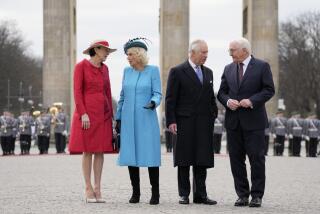Baker to Aim for Better Relations in Bonn Visit
- Share via
BONN — Secretary of State James A. Baker III will arrive Sunday in Bonn in an effort to do something about what diplomats say is the rockiest period in U.S.-German relations since the conservative Helmut Kohl became chancellor in 1982.
“I think Secretary Baker would be wise to pour oil on troubled waters,” a Western diplomat observed. “The waters have certainly been rough lately.”
Another diplomat said Baker’s visit would be an opportunity for damage-control in the all-important Bonn-Washington relations.
Baker will find an undercurrent of anti-U.S. sentiment in the West German news media and public opinion, an undercurrent that surfaces only rarely.
He will find a government that has been floundering in domestic and foreign issues alike, without firm direction, and a governing coalition that is often at odds with itself, incapable of lessening the strains in the Bonn-Washington alliance. These strains have become a matter of concern for other members of the larger Western Alliance.
Concern Over Sovereignty
The German grievances are sometimes vague--for example, a feeling that West Germany does not have full sovereignty so long as foreign troops from NATO, mostly U.S. troops, are based on German soil.
Some West Germans have come to regard the U.S. troops as a kind of occupation force, a misapprehension rarely corrected by left-wing elements of the German press and politics.
But some complaints are specific, involving massive troop maneuvers that damage the environment and low-flying jet fighters that present a noise nuisance and a safety problem, when they crash. The United States and other members of the North Atlantic Treaty Organization are dealing with these problems, but belatedly.
Many Germans resent what they consider undue U.S. pressure on their government--to modernize short-range nuclear weapons, for instance, and to enact laws banning the sale of certain chemicals to foreign customers.
None of this has been helped by what many regard as the ham-handedness of Kohl and some of his close advisers. Virtually everyone agrees that Kohl mishandled the recent controversy over West German firms that supplied materials to what were said to be chemical weapons plants in Iraq and Libya.
Grudging Admission
Instead of investigating the charges, which had been made privately to Bonn by U.S. intelligence agencies, Kohl attempted to exonerate the firms publicly and complained about lack of evidence. Only later did he grudgingly admit that his own intelligence service had confirmed much of what the Americans had told him.
Also, Kohl is being blamed for sharpening the fractious argument over modernizing short-range nuclear weapons, those with a range of under 300 miles. NATO decided to modernize as far back as 1983, yet Kohl has since allowed the issue to be dragged back into the political arena.
NATO planners charged with upgrading U.S.-made Lance missiles fear that Kohl may try to duck the issue until after federal elections in December, 1990. Their fears appeared to come true Friday with a report in the Financial Times of London quoting Kohl as saying a decision on whether to modernize such missiles should be put off until 1991 or 1992.
The newspaper reported that Kohl said in an interview that Lance missiles remain “sufficient and intact until 1995 . . . . The real decision over the production (of a successor) will be in 1991-1992.”
Such a delay would infuriate NATO officials, and Washington needs a firm decision in order to plan a successor to the Lance.
Outflanked by Genscher
Kohl, a Christian Democrat, has allowed Foreign Minister Hans-Dietrich Genscher, whose Free Democratic Party is part of the governing coalition, to outflank him internationally with suggestions that any modernization of the missiles be delayed until after an agreement at next month’s conventional arms talks in Vienna.
Genscher has been much more supportive of the policies of Soviet President Mikhail S. Gorbachev than most other Western leaders, including former President Ronald Reagan and President Bush. Some Americans officials use the term “Genscherism” to denote German unreliability in dealings with the East.
The U.S. Embassy here has been embarrassed by West German public opinion polls showing Gorbachev to be vastly more popular than U.S. leaders, and showing that West Germans believe there is a greater risk of war caused by the United States than by the Soviet Union.
Washington has often lost sight of how deeply most West Germans, who live on the line between East and West, desire better relations with the Soviet Union and its satellites, especially East Germany.
This was put into words recently by Freimut Duve, a member of Parliament of the opposition Social Democratic party. He said: “I am very much a postwar child, and I am not anti-American. But I do get angry when people abroad try to tell us how to read Gorbachev. They can’t judge what East-West disarmament means to us on the front line.”
Outgoing U.S. Ambassador Richard R. Burt has worked hard to nurse the Bonn-Washington relationship back to health. He describes recent rifts as part of West Germany’s coming of age, and reflective of a deeper change in the roles of the two allies.
The change, Burt says, means a larger and more assertive international role for West Germany, with attendant aches and pains in its relationship with the United States.
More to Read
Sign up for Essential California
The most important California stories and recommendations in your inbox every morning.
You may occasionally receive promotional content from the Los Angeles Times.










